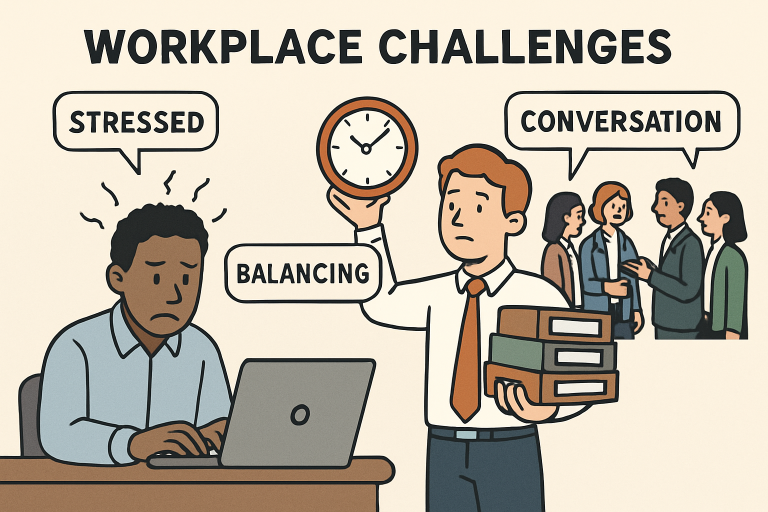Key Takeaways
- Effective communication is crucial for team cohesion and project success.
- Maintaining a healthy work-life balance prevents burnout and promotes well-being.
- Adapting to technological advancements requires continuous learning and support.
- Addressing workplace politics and fostering inclusivity enhances morale and collaboration.
Table of Contents
- Introduction
- Communication Breakdowns
- Work-Life Balance
- Technological Adaptations
- Workplace Politics
- Career Development
- Mental Health and Well-Being
- Diversity and Inclusion
- Conflict Resolution
Introduction
Employees across every industry encounter a range of challenges that can shape their work experience, from daily frustrations to more systemic obstacles that impact careers and well-being. Organizations and employees must understand these challenges to create a more functional, respectful, and motivating workplace. For those who find themselves facing difficult conditions, including issues like bias or unfair treatment, consulting with an employment discrimination attorney can be an important step toward securing the support and solutions they need.
Many of these obstacles, such as poor communication or the struggle to balance professional and personal demands, are nearly universal, but they can be addressed with proactive strategies. Organizations that foster transparency, prioritize employee well-being, and adapt to technological and social change tend to see higher productivity and morale. By identifying and actively managing workplace challenges, employers and employees can create an environment where everyone has an opportunity to thrive.
Communication Breakdowns
Poor communication tops the list of workplace challenges. Misunderstandings, ambiguous directives, and infrequent feedback can result in missed deadlines and fractured team dynamics. Transparent, honest, and consistent communication encourages trust and alignment, which are essential for daily processes and long-term success. Regular team meetings, collaborative platforms, and active listening can close these gaps and foster a sense of connection among employees.
Work-Life Balance
The increasing blurring of lines between professional responsibilities and personal life has brought work-life balance into sharper focus. Employees regularly face pressures to work overtime, check emails outside office hours, or sacrifice personal time for job duties, leading to burnout. Organizations can support balance by offering flexible hours, encouraging vacation days, and providing resources for personal growth and well-being. Individual time management skills are important, but larger structural changes often have the most significant impact.

Technological Adaptations
Rapid digital transformation can overwhelm employees as they try to keep up with ever-evolving platforms, software, and workflows. Organizations must offer ongoing training and maintain open lines for technical support. Employees benefit from a culture that values continuous learning and experimentation, allowing them to engage with new technologies without fear of failure or judgment. According to Forbes, fostering a growth mindset helps ease transitions when new systems or platforms are introduced.
Workplace Politics
Office politics often revolve around internal power dynamics, favoritism, or the formation of cliques. When left unchecked, this can deteriorate trust, causing disengagement and turnover. Leadership is key in setting the tone here: valuing merit over alliances and maintaining transparent decision-making promotes fairness and inclusiveness. Employees also need access to advocacy resources and tools for managing difficult or political situations.
Career Development
The modern workforce is increasingly focused on career progression and personal development. However, unclear pathways for advancement, lack of mentorship, and minimal access to training can all result in stagnation and high turnover. Forward-thinking organizations address this by investing in career mapping, offering regular performance reviews, and supporting cross-training opportunities. Structured mentorship programs can also provide employees with personalized guidance and meaningful professional relationships, as outlined by the Harvard Business Review.
Mental Health and Well-Being
Mental health challenges such as stress, anxiety, and depression are unfortunately common in today’s fast-paced work environments. These issues can manifest in decreased concentration, absenteeism, or lower productivity. Creating a workplace culture that de-stigmatizes mental health discussions, offering employee assistance programs, and promoting access to resources such as counseling or mindfulness workshops can radically improve outcomes for those struggling. Early intervention and visible leadership support are key to this effort.
Diversity and Inclusion
Diversity and inclusion are now recognized as critical components of organizational success. However, challenges persist as employees may experience bias, microaggressions, or feel excluded from key decisions and opportunities. It is vital for companies to go beyond simple policy statements, actively implement diversity training, establish employee resource groups, and track the impact of inclusivity efforts on workplace culture. A strong commitment from leadership ensures that diverse perspectives are welcomed and celebrated, promoting greater innovation and better problem-solving.
Conflict Resolution
Disagreements and tension are inevitable in any work setting. However, when conflicts are not addressed promptly or fairly, they can escalate into larger issues that poison morale and productivity. Providing access to structured conflict resolution resources—such as workshops, mediation services, or clearly defined escalation protocols—empowers teams to handle disputes constructively and promptly. Encouraging open dialogue and focusing on collaborative solutions helps restore trust and strengthen relationships.
Employers and employees can build a healthier, more productive work culture by proactively identifying and tackling these common workplace challenges. Embedding effective communication, supportive policies, and opportunities for personal growth is not just good for business—it is essential to attracting and retaining top talent.

